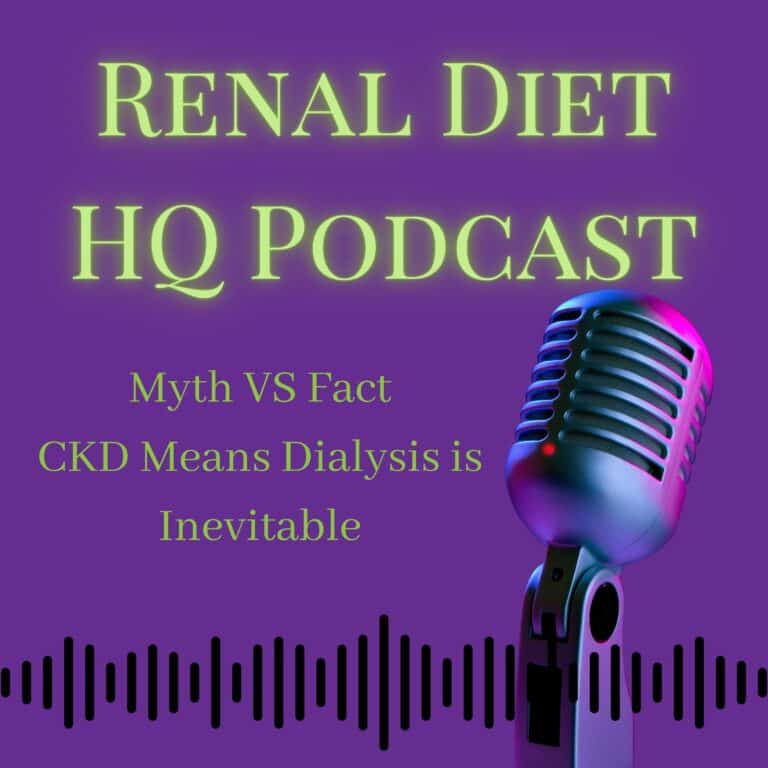Renal Diet Podcast 082: The Importance of Exercise for CKD Patients
Podcast: Play in new window | Download
 The Importance of Exercise for CKD Patients
The Importance of Exercise for CKD Patients
Podcast #82 Released on February 26, 2018
I want to talk about the importance of exercise for people with chronic kidney disease and I think it's really important to understand that there are some simple things that you can do that can increase the amount of exercise you have and you do in your life and then over time you can build up to a little more.
When you're diagnosed with chronic kidney disease, usually you have a few other issues going on. May have some heart problems, you may have diabetes, you may have high blood pressure so any of those things means that you need to talk to your doctor first before you begin any sort of exercise program. So, don't take this podcast or live as a license to go exercise without talking to your doctor.
Now, if your doctor has told you to start exercising then that start definitely something that you should do. If you aren't active, make sure you talk to your doctor.
I also attach to the article that I've put in the link renaldiethq.com/importance-exercise-CKD-patients.
I want to just talk about exercise first in general because it's a really important concept and you might not think that it makes that much difference or maybe you think it makes a lot of difference but you just can't do it. But the thing is you can, as long as your doctor says it's okay it's going to benefit you in a lot of ways. One of the main things that I've found that it does is it reduces your fatigue.
Exercising even just a small amount and building up it reduces your fatigue. If you're tired at the end of the day, doing a little exercise which may seem counter intuitive; doing a little exercise is going to change the way you feel at the end of the day and you're not going to be as tired. It'll take a week or so for that to start happening but if you continue it that you will see it happen. It helps with weight management. Exercise helps lower your blood sugar, it helps lower your blood pressure, it helps with weight management, it burns off calories that your body has stored over time for you and the form of fat or other compounds in your body so exercise helps with weight management.
If you're already at a healthy weight, exercise helps you again in many other ways like lowering your blood pressure. Making your heart work a little harder and then relaxing on a regular basis is something that is amazing for your blood pressure, your body learns to recover, your body learns how to manage that stress that you're creating and it learns how to speed up "Okay, I need a little more heart blood pressure" and then slow down when you are done exercising so your body adjusts much more quickly when you're doing that in real life. Say, your doctor just tells you some bad news or something. Yes, your heart's going race for a minute but then it's going to recover. Just makes it a lot easier for you to recover and it also improves your blood pressure level which is always good for people with kidney disease.
Exercise can reduce anxiety and depression. It may seem like why would I do that or maybe I'm not depressed maybe I don't feel anxiety maybe you do but what it does is it releases hormones into your body and then your body learns how to manage those better so you won't feel like if you have anxiety because your body suddenly you know had a feeling that something was wrong, released some of those hormones that were used in the fight-or-flight response and they caused some anxiety then your body if you're exercising you're doing that on a more regular basis so your body manages that better. Also with depression you release some good feel feeling hormones in your body with exercise which improves your mood.
In a 2014 study by the American Society of Nephrology, they found that 12 months
of exercise based rehab significantly slowed the rate of kidney function decline and improved cardio respiratory fitness compared with just regular standard care.
Walking is the best exercise. You can get started without any equipment, you can just go outside, you can take your dog for a walk, you can take yourself for a walk, you can go with family member - all those things can help but get some walking in.
Another option is swimming. Swimming is very low impact almost no impact and it supports your body weight so it helps you to get moving and it's a very gentle exercise and it doesn't like you're not sweating, you're not getting hot and overworked. It's a very beneficial exercise and it's good for your whole body workout.
Some tips when you're exercising with kidney disease. You don't want to overdo it so you want to definitely do the amount that your body can handle. You want to work up to it slowly. Remember that it's it's a long-term plan. Marathon runner does not star
t by running 26 miles. They start running, walking, running, walking you know kind of a mixture. Start with ten minutes a day if you can manage 10 minutes a day for a month, you're going to be so much better off than if you had said "I don't have time to do 30 minutes I can't even do any," you can do 10 minutes. Just do 10 minutes. Stand in your kitchen while you're making food and march and just try to march for 10 minutes so that's an idea - a good idea.
Pay attention to your breathing. I'm talking kind of fast and I'm getting a little bit out of breath but when you're exercising you should be able to still talk to the person that you're working out with or just speak in a normal tone especially in the beginning. If you're panting or you can't get more than a few words out, you might need to slow down because you're doing too much.
Schedule your exercise. Add a good time so don't exercise right after you eat a large meal and don't exercise usually within about an hour of going to bed just because it works your body up and it she not to be able asleep very well. But if you're planning on your exercise then you know people would say "what's the best time to exercise?" It's when you'll do it. If you are in the house and you're eating lunch and you can march for 10 minutes do it then. If you're able to get up in the morning and do it early and before you go to work or before you start your day, that's a great time. Just work it in. If you're going to do it outside, make sure you're not doing it in the hot part of the day just be very careful because you're very susceptible to heat stroke and those types of problems.
Watch your fluid intake. Make sure you're drinking plenty of water. If you have a limit on the amount of fluid, you definitely want to talk to your doctor about how to handle that but most of the time with exercise you're gonna want to drink a little more have a little more liquid to help your body recover better. Keep in mind your limits and what you're supposed to do but do try to drink plenty of fluids.
Wear appropriate clothing. Wear comfortable clothing, light-colored clothing if you're outside and breathable materials, comfortable shoes, don't wear your Birkenstocks on a walk which I would do but wear tennis shoes, wear shoes that are going to support your feet, wear comfortable clothes. If you wear comfortable clothes most the time just make sure you put your shoes on and go for that 10-minute walk. I'm just encouraging you to get started and if you already started, do more but if you haven't even started don't let it be a reason that you have to do 30 minutes let it be 10 minutes three times a day or something.
Some signs you should stop exercising right away. If you're having these feelings you need to stop exercising right away. It may mean that something else is going on. If you immediately experience fatigue like you're all of a sudden so tired you can't go on then you need to stop; if you feel light-headed, if you feel short of breath so you can't even get that in in a regular heartbeat, if you're feeling like your heartbeat is racing or any sort of chest pain especially that radiates up into your neck or down in your arm - any of those you stop immediately and seek medical assistance.
Some low-impact exercises for chronic kidney disease. Besides standing in your kitchen and marching or doing like a light walk. Something you can do that can help with your balance is a sit to stand. That is just where you kind of you're sitting in your chair and you stand up and you sit back down but you don't sit down completely and then you stand back up so it's kind of like doing squats. You're going to do that just slowly sit in the chair, stand up sit down, stand up, sit down as much as you can. In the handout there is a video link for you to look at. You can hold dumbbells in your hand or you can hold a couple cans in your hands to do those but those are some ideas for kind of balance.
Number two, you can do an elliptical machine for cardio. If you don't have a treadmill you may have access to an elliptical and elliptical is great because it is very low impact but it's very cardiovascular friendly because you're moving your arms and you're moving your legs at the same time so you're building up that endurance.
Third one is foot circles. You're going sit in your chair and you're going to raise your foot off the ground and rotate your foot one direction for 30 seconds and then the other way for 30 seconds then you're gonna switch feet something you can do while watching TV, something you can do reading in a book, something new in the car if you're a passenger - those types of things.
Those are great ideas for you to get started with some specific things. After you do your walking or maybe you decide the elliptical, do some sit to stands, do some circulation and on my handout there's variations or ways to make it harder more challenging.
Send in your questions about all things related to Chronic Kidney Disease to [email protected]
Don’t forget to check out my blog.
Email me at [email protected] for suggestions
Find us on iTunes at: www.renaldiethq.com/itunes
Find us on stitcher radio at: www.renaldiethq.com/go/stitcher

 The Importance of Exercise for CKD Patients
The Importance of Exercise for CKD Patients





